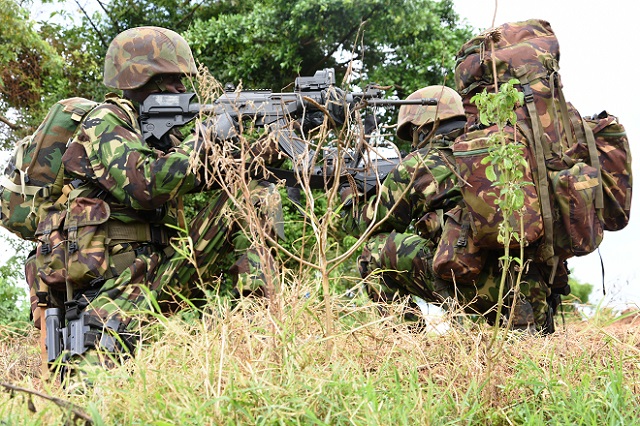
Kampala, Uganda | THE INDEPENDENT | Ibrahim Ssemujju Nganda, the Kira municipality legislator has urged his colleagues in parliament to reject the government’s move to make the elite Special Forces Command-SFC an independent service unit of the Uganda People’s Defense Forces-UPDF.
Speaking to Uganda Radio Network in an exclusive interview, Ssemujju who has been the most outspoken critic of the SFC, said parliament must not escort President Yoweri Museveni in legalizing an entity that he created illegally.
Last week, the Defence State Minister, Huda Oleru Abason introduced a bill seeking to amend the UPDF Act 2005 to among others make the SFC a service of the UPDF. Ssemujju has repeatedly said, the SFC is an illegal entity because it was not created by Parliament as both the constitution and the UPDF Act demand.
The Constitution under Article 210 states that; “Parliament shall make laws regulating the Uganda Peoples’ Defence Forces and, in particular, providing for 1. (a) the organs and structures of the Uganda Peoples’ Defence Forces.” Section 2 of the UPDF Act states that; “The Uganda Peoples’ Defence Forces shall be composed of the following Services; (a) the Land Force; (b) the Air Force; (c) any other service prescribed by Parliament.”
Therefore, to Ssemujju for the time the SFC has existed without parliamentary authorization means that it has been an illegal entity that was simply created to serve the interests of President Museveni. Ssemujju said President Museveni embarked on building his army immediately after capturing power in 1986.
Ssemujju says as a journalist he closely followed the military and he remembers that in around 2000, when the government was in the process of enacting, the UPDF Act 2005, President Museveni had meetings with high-ranking members of the army who he presented the idea of forming the SFC.
He says this was opposed by many who argued that creating an SFC in Uganda, was akin to creating an army with an army. “Those who spoke against creating a force within a force argued and rightly so that where they have created them, there have always been problems. In countries like America and Israel, they might have special forces that do particular work but what distinguishes them from the rest of the military is the work they do but they are not a special force. These so-called elite forces are created by dictators as their armies. In America, no president has got an army, but in Iraq and Iran these forces belonged to the leaders and operate outside the regular military,” Ssemujju said.
He added that if anybody doubts the dangers that a force within a force poses to the country, they shouldn’t look no further than Sudan where the regular army has been tussling it out for now over a year with the Rapid Support Forces-RSF, the elite force created by former president Omar el Bashir.
Ssemujju also said that what makes the SFC even more suspect is the mystery in which it is shrouded. He said nobody knows how those in the force are recruited, remunerated, trained, promoted, and what areas they are operating. Unlike the regular army that recruits from across the country, Ssemujju said, the SFC is largely composed of and commanded by people who come from the same ethnic group.
“When I was at the Makerere university in 1997, Muhoozi came and started recruiting students from his ethnic group, other than that, we don’t know what criteria they use. Everything serious in the military has now been appropriated, the artillery, the mechanized brigade, and the infantry are now all under the SFC because they have become too many. They now even have their headquarters in Entebbe, even before the law is made, for them they are already made with a status, the law simply comes to validate what Museveni has been doing,” Ssemujju said.
But he added that the bringing of the bill will help them ask questions that the government has been dodging.
Ssemujju said the introduction of the bill vindicates him and shows the public that when they talk about certain things, they don’t talk about them simply because they don’t like President Museveni and his government but because there are concerns even from people within the system.
Efforts to reach the Minister of Defence and Veteran Affairs, Jacob Oboth Oboth, who signed the memorandum accompanying the UPDF Amendment Bill 2024, or his deputy, Huda Oleru, were unsuccessful as neither responded to our calls nor returned messages left on their known numbers.
Brigadier Felix Kulaigye, the Spokesperson for the Defence and Veteran Affairs Ministry and the Uganda People’s Defence Forces (UPDF), stated that the Special Forces Command (SFC) has long operated as a de facto entity, and the proposed bill aims to formalize it as an official service. He added that they have, for some time, advocated for amendments to the UPDF Act to reflect evolving needs within the military.
Asked about what kind of roles the SFC would play after it becomes a service of the UPDF since the roles of the Land Force and Air Force; are known, Kulaigye refused to be dragged into the debate. “You want me to become your research assistant?” Kulaigye responded.
According to a memorandum justifying the bill signed by Oboth Oboth, the amendment was done to conform to changes that the UPDF has witnessed since 2005 when the principal act was passed. “Since 2005, the defense sector has transformed both operationally and administratively. It is therefore imperative to substantially amend the Act to address the existing gaps and take into account new government policies…the defense sector has undergone significant transformation arising from both emerging threats and opportunities. Several of them were unforeseen and not adequately addressed by the Uganda Peoples’ Defence Forces Act,” the memorandum accompanying the bill reads in part.
Until recently, the Special Forces Command (SFC) was led by President Yoweri Museveni’s son, Muhoozi Kainerugaba, who currently serves as the Chief of Defence Forces. The SFC is now under the command of Maj. Gen. David Mugisha. Previous commanders include Felix Busizoori, Peter Candia, James Birungi, Don Nabasa, Leopold Kyanda, and Akanga Byaruhanga, among others.
****
URN
 The Independent Uganda: You get the Truth we Pay the Price
The Independent Uganda: You get the Truth we Pay the Price


